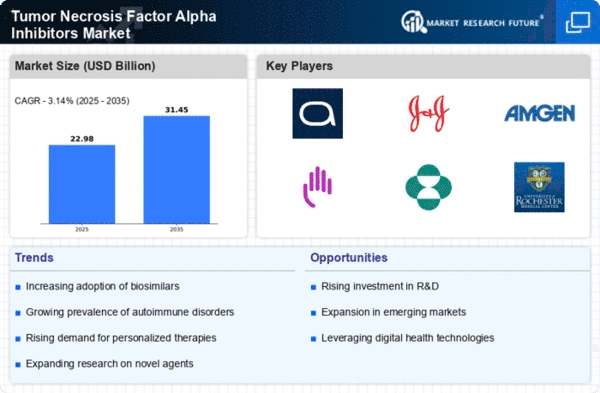Market Share
Tumor Necrosis Factor Alpha Inhibitors Market Share Analysis
Tumor Necrosis Factor Alpha (TNF-α) Inhibitors Market is experiencing transformations brought by biotechnological advancements, research breakthroughs and an increasing trend of inflammatory diseases. TNF-α inhibitors, the class of drugs that act on the inflammatory cytokine, TNF-α, have become the key players in the treatment of different auto-immune diseases like rheumatoid arthritis, psoriasis and inflammatory bowel diseases. An important trend in this market is the growing list of new therapeutic uses for TNF-α inhibitors. These medications have long been associated with rheumatologic disorders, but the ongoing research is revealing their ability to treat other inflammatory diseases, hence expanding the market base.
On the other hand, there is a trend to create biosimilars for TNF-α inhibiters. As the patents for originator drugs expire, cheaper biosimilars are entering the market, gradually replacing the originator drugs. This development not only diversifies the market but also increases the presence of these critical products, leading to a faster expansion of the market. Biosimilars are responsible for inexpensive and easy availability of TNF-α inhibitors, especially in countries where healthcare costs are critical.
The TNF-α Inhibitors Market has seen an increase in the efforts to develop better drug delivery options, which are more user-friendly. Subcutaneous preparations which can be self-administered by patients are becoming more favored than old fashioned intravenous infusions. This trend does not only meet the convenience of the patron but also reduces the pressure on healthcare facilities and hence contribute to the efficiency of treatment.
The role pharmaceutical companies, research institutions and healthcare providers play in the formation of the TNF-α Inhibitors Market is illustrated by their collaborations and partnerships. Such alliances create a cooperative environment that is conducive to research and development driving the improvement of the existing drugs, and finding new indications. Besides the increased funding for clinical trials, the emergence of evidence supporting the efficacy and safety of TNF-α inhibitors across different patient sub-groups is one of the major contributors to the growth of the evidence base for these medicines.
The market is witnessing a growing trend of patient centricity where the emphasis is on ensuring that patients obtain the desired adherence and outcomes. Education programs and support services for patients are aimed at equipping the people with TNF-α inhibitor therapy with knowledge on their conditions and medications so that they enjoy better health outcomes. This patient-specific approach is not only a means of improving healthcare as a whole but also ensures the long-term market success of these inhibitors by avoiding treatment interruptions.



















Leave a Comment